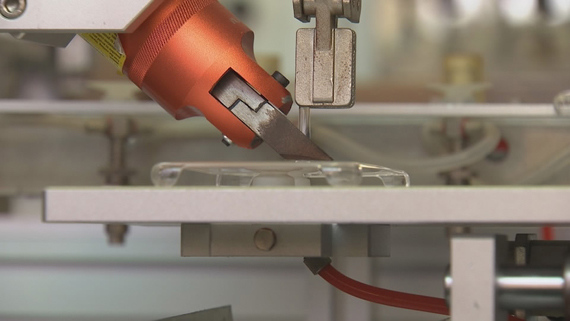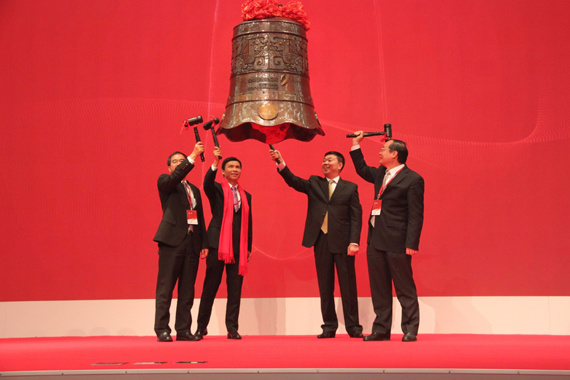
Silver Basis Technology is Huawei's protective case contractor. (Photo/CGTN)
Have you ever wondered how your smartphone's protective case is made?
Silver Basis Technology is Huawei's protective case contractor. In one of its factories located in China's southern city of Dongguan, robotic machines process plastic raw material, and produce one case every two and a half minutes.

50 million phone protective cases come out of this factory every year. (Photo/CGTN)
The numbers are startling. It takes a mere 38 robots to make a whopping 50 million cases for Huawai smartphones every year. This automated factory was established in 2015, in a bid to offset rising worker wages.
Guo Qiusheng, vice manager of Silver Basis, told CGTN that now their automatic machines could reduce the use of human labor by 90 percent. In the past, ten machines would require ten operators. But now, the same amount only needs one person.
Like Guo's company, an increasing number of manufacturing companies in Dongguan are opting to take the high-tech route.
China has already become the world's largest robotics market. In 2015, over 68,000 industrial robots were sold in China. That means one in every three robots across the world were sold to China. But Chinese robot companies only account for eight percent of the market.

The bell is rung for Topstar, marking its listing on the Shenzhen Stock Exchange. (Photo/CGTN)
This huge gap is making robot companies a new favorite in the Chinese capital market. Topstar, a robot company in Dongguan, was recently listed on the Shenzhen Stock Exchange, raising over 300 million yuan, or about 44 million US dollars.
And that money was quickly invested into company expansion - building new factories and increasing capacity.
Wu Fengli, founder and CEO of Topstar, said " we expect to increase our production capacity to a value of over 1 billion to 1.5 billion yuan every year when the new factory is finished. 20,000 more six-axis-joint robots can be made."
Though Chinese companies still lag behind in developing the key components of robots, Wu is confident his firm can benefit from some advantages other global robot giants may not have at their fingertips.
In this case, the age old concept of "location, location, location" comes to mind, with Topstar based in the bustling city of Dongguan, well known as a major manufacturing hub of clothes and technology.
Wu told CGTN: "Dongguan has its unique regional advantage - the market is at the factory gate. All of our new products can be quickly tested in nearby factories. No groping in the darkness, no trial and error, we can customize our products based on customer demands with first-hand market information."
For instance, one of the biggest obstacles hindering factory owners in Dongguan from buying more robots, is a lack of experienced operators.
At the entrance of Topstar's main hall, there is a toy grabbing machine. Unlike those in the gaming rooms, this one is equipped with a cutting-edge robotic arm. With a few clicks on the tablet, operators can capture a toy within a minute.
Wu said when industrial robots can be simplified into something that kids can play with, that will be the time for all small factories to start using robots as their main labor force.


















































